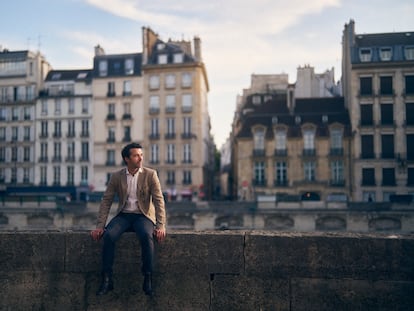Pierre Crétois, philosopher: ‘We cannot pretend to be absolute masters of things’
In his new book, the French thinker invites us to reconsider property. He affirms that the ideology that sustains it impedes the advancement of struggles for justice

The French philosopher Pierre Crétois is aiming to achieve something difficult: that we completely rethink how we relate to property. Today’s societies, he argues, are permeated by the belief that if you own something, you have all the rights to it. His goal is to break with that conviction that has structured social relations and, according to him, has prevented us from moving towards equality and respect for the environment. A student of the currents of socialist and solidarist thought, from communitarianism to libertarianism, in 2022, while teaching at the University Bordeaux-Montaigne, he published La part commune [The common share], a book in which he deconstructs and invites us to reconsider the concept of property. The climate crisis is the right time to do so, he argues. The interview takes place in Paris, in a restaurant between the Seine River and the Sorbonne. In his second book, La copossession du monde [Copossession of the world] (2023), he goes a step further and rejects the idea that the right to property is necessary for social order.
Question. In your work you quote a phrase from the French philosopher Jean-Jacques Rousseau: “The demon of property infests everything it touches.”
Answer. Rousseau shows how the introduction of property gives structure to relationships of domination and is one of the causes of inequalities. For Rousseau, inequality implies not only differences, but hierarchical relations. It is the way in which property imposes a structure on social relations and relations of domination between human beings. On the other hand, another strong idea in Rousseau is that he believes that we enjoy things better when they do not belong to us. This aspiration for exclusive possession turns property into a burden, a series of inconveniences, and results in a breakdown of social ties.
Q. Do you stand for the same thing?
A. I argue that ownership is a modality of property in common: we cannot claim to be owners of things, but simply owners of some rights over things, compatible with the rights of others. When we ask someone if they own their house, they actually own some rights to the house to the extent that they are compatible with the rights of others. Basically, I can’t do what I want with my façade when I am in a protected area; just because I am in my house, I can’t do absolutely whatever I want. There are a number of rules that mean that we can never claim to be absolute masters of things. We only have relative rights over them.
Q. There are already legal limits on ownership or enjoyment.
A. The fundamental argument is to attack the proprietary ideology. That is the problem. It is not so much the rule of law, but the belief that we can do absolutely whatever we want with what belongs to us. And that has many implications, including the belief that the state should not be allowed to withhold a portion of our resources. In reality, the law does not work that way, but it works in a way that can be criticized, which starts from property and then tries to make it compatible with coexistence with others. For me, we have to turn things around, we have to start from the fact of coexistence and then see how rights are distributed. And that would change everything. It would avoid certain tensions.
Q. What tensions, for example?
A. The right of ownership over rent controls. Every time you want to regulate rents, you give a voice to landlords who say: “No, but that belongs to me! In whose name would the state have the right to control what I do with what belongs to me?” Proprietary ideology permanently impedes the advancement of struggles for justice.
Q. You explain that this relationship with property was not always the case. What can we draw inspiration from?
A. There is a date of birth of the proprietary ideology, and an author like John Locke formulates it quite clearly in the fifth chapter of the second Treatise on Civil Government, 1689. But earlier, in the medieval period, there were overlapping land rights. One person had the right to cultivate the land, but another collected the first acorns. There was a whole series of land uses that were shared among the members of the community, which also allowed landless shepherds to live because their sheep could go to pasture. But it is not a model. The point is to say that there were times in European life when there was no such thing as private appropriation. I don’t think we need to go back to medieval times. But we can function differently.
Q. Isn’t that a rather utopian idea?
A. I do not believe that inviting a transformation is utopian. I think it is part of the times we live in. The environmental crisis shows us that we cannot separate ourselves, that we are linked to ecosystems. It is not only a matter of preserving them, but also of rethinking our role within them. Preserving is the same thing again: you do what you want with what belongs to you, but you have to be respectful of the environment. And no: we are immersed in an environment, and what belongs to us is part of this environment and must function in it.
Q. How could such a transformation be accomplished?
A. There are many ways to do it. When we talk about ecological debt, it is a way of saying that the way you use what belongs to you has real external effects on the environment. We should start from what is compatible with a sustainable life for the environment, and then see what rights can be legitimately exercised over what belongs to us.
Q. How do you share out property held in common?
A. One example is the Mar Menor, which they decided to endow with legal personality. It is not perfect, but it is an interesting idea that consists of starting from common property and listening.
Sign up for our weekly newsletter to get more English-language news coverage from EL PAÍS USA Edition
Tu suscripción se está usando en otro dispositivo
¿Quieres añadir otro usuario a tu suscripción?
Si continúas leyendo en este dispositivo, no se podrá leer en el otro.
FlechaTu suscripción se está usando en otro dispositivo y solo puedes acceder a EL PAÍS desde un dispositivo a la vez.
Si quieres compartir tu cuenta, cambia tu suscripción a la modalidad Premium, así podrás añadir otro usuario. Cada uno accederá con su propia cuenta de email, lo que os permitirá personalizar vuestra experiencia en EL PAÍS.
¿Tienes una suscripción de empresa? Accede aquí para contratar más cuentas.
En el caso de no saber quién está usando tu cuenta, te recomendamos cambiar tu contraseña aquí.
Si decides continuar compartiendo tu cuenta, este mensaje se mostrará en tu dispositivo y en el de la otra persona que está usando tu cuenta de forma indefinida, afectando a tu experiencia de lectura. Puedes consultar aquí los términos y condiciones de la suscripción digital.









































